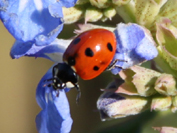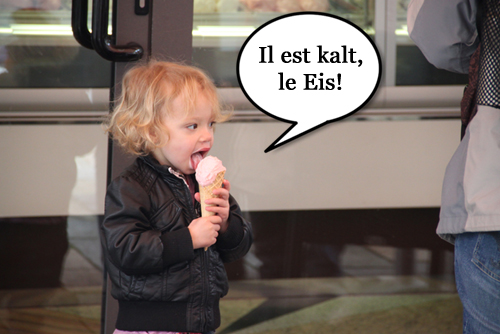When this afternoon, returning to the car at a shopping centre, our little girl asked about “les pâtes”, we thought she was talking about dinner. But when the question came again, “les pâtes pour la piscine” (the pasta for the swimming pool) this time, we had to dig a little deeper.
Take a guess before you read on.
Hint #1: It’ll be easier for German and English speakers to find.
Hint #2: We’d just been at a sports store that day and bought something for her to use at the swimming pool during the holidays when the baby swimming equipment is not available.
Hint #3: Daddy calls it a “frite”, a fry as in French fries or a chip as in fish and chips.
Answer: her pool noodle (simply “Nudel” in German). Guess who she had been to the pool with recently 🙂
Filed under: bilingual/zweisprachig, English, speaking Comment (0)
Article tags: language acquisition, mixing languages, multilingual
The other day it hit me again how most of the German words our now three-year-old uses in her mixed sentences are either nouns or adjectives. A linguist could probably give me a complicated explanation, but I’ll stick with the simple one that they are easier to use than verbs. Examples?
Donne-moi la Buch! (By the way, everything’s still female in her French world.)
le tabouret groß
Again, when asked, she’ll provide the German verb, in it’s infinitive version (“aufmachen”). A notable exception (and what does that tell you about me?):
Hör auf!
Filed under: bilingual/zweisprachig, English, speaking Comment (0)
Article tags: language acquisition, mixing languages, multilingual
My little girl just turned three, and she talks a lot – in French, but liberally sprinkled with German words, such as:
“Donne-moi da [das] Buch.”
If you ask her “How does mommy say?”, she’ll immediately provide German words for such terms as aujourd’hui – heute (today), jaune – gelb (yellow) or hippo – Nilpferd (hippo).
This is a fun stage. 🙂
Filed under: bilingual/zweisprachig, English, speaking Comment (0)
Article tags: language acquisition, mixing languages, multilingual
The other day we met our former neighbours in the playground. The mom is German too, and her son is three years older than my girl and already fluently bilingual. We used to meet frequently when they still lived next door.
The kids played together and we talked until it was time to leave. As we headed towards the exit, my girl and I were trailing a few steps behind. She started to panic that the others would leave without us and called after them.
“Attends! Attends! Attends!”
“Wart!”
and finally
“Wart auf mich!”
First time I heard that from her. 🙂
Filed under: bilingual/zweisprachig, English, speaking Comment (0)
Article tags: language, language acquisition, multilingual, multilingue, Zweisprachigkeit
Yesterday morning, my little girl made me laugh. She took my arm, looked at my watch (upside down) and declared “C’est l’heure pour chocolat.” (It’s time for chocolate.)
Of course I had to share that story with my mom. So when we called her last night for a little chat, with the loudspeaker on so all three of us could communicate, I told her about it.
My mom asked “Und dann hat sie ein kleines Stück Schokolade bekommen?” (And then she got a small piece of chocolate?)
Whereupon my girl replied: “Großes Stück Schokolade.” (Big piece of chocolate.)
My mother: “Hast sie das jetzt wirklich gerade gesagt?” (Did she just say that?)

Filed under: bilingual/zweisprachig, English, mischief, speaking Comment (0)
One of the cutest expressions from my little girl was her name for this:

“bébé Maria”
Yesterday she called it a “Marienkäfer”.
And today she asked me for “Apfelsaft” instead of her usual “jus pomme”.
Where does time go?
Filed under: bilingual/zweisprachig, English, speaking Comment (0)
Article tags: language acquisition, mixing languages, multilingual
A multilingual friend of mine whom I interviewed for this blog a while ago read my recent post asking Why not English?
Here’s her reaction:
Forget English, German is the tongue that we all wish to know, to emigrate to the country of jobs and money!!! (that’s what they say everyday on Spanish TV).
But you are not just teaching her a language, you are teaching her about her origins, where she comes from, to interact with family and giving her the opportunity to go back if she wishes to do it. I’ve known some people who migrated here young or are born here from immigrant parents, and lost the mother tongue, and regret it (and yes, even with useless internationally speaking languages). And even people who growing up decided to learn what had been lost.
… and you’ll give her something to talk about: “say something in German!” “I’m so jealous you talk an other language, but you know, you should talk Chinese!”
She’ll learn English anyway sooner or later.
Filed under: bilingual/zweisprachig, English Comment (0)
Article tags: language, language acquisition, mother tongue, multilingual
Wir waren ein paar Tage bei der Oma. Ich habe eine Reihe deutscher Wörter gehört (danke schön, Mama!) und merke, es geht auch zu Hause weiter. Vorhin beim Auspacken der Einkäufe reichte sie mir meine Sachen mit “Für dich!”
Wir sind in Deutschland
Schon im Zug merkte sie, das etwas anders ist. Nach der Ansage des Zugbegleiters im IC (“Wir verabschieden uns von allen Fahrgästen, die in Solingen aussteigen…”) sagte sie mir:
“Mama, le monsieur dit aussteigen!”
Mit Oma en allemand
Wir essen Abendbrot bei Oma. Sie möchte eine (große) Scheibe Mettwurst haben und bittet Oma: „Couper!“ Oma versteht nicht. Zunächst wiederholt sie „couper“ mehrmals, dann zeigt sie auf das Messer. Erst als Papa sagt „en allemand“, sagt sie „abschneiden!“
Pas richtig!
Oma zeichnet einen Fisch von der Buntstiftpackung nach. Die Umrisse sind schon da, aber er ist noch nicht ausgemalt.
Sie sagt: “C’est pas le même!” und dann: “Est pas richtig, la Fisch!”
Filed under: bilingual/zweisprachig, Deutsch, speaking Comment (0)
Article tags: mixing languages, Sprache, Sprachenlernen, Zweisprachigkeit
You might have noticed we like cows. The other day, near my aunt’s, we drove past the local elementary school. Next to it was a farm, and two young cows were curiously looking through the fence. (Maybe they were hoping, like Pippi Longstocking, that some wisdom would come out the window and stick with them.) Anyway, Daddy pointed them out to us, and our girl gleefully counted them:
“Un bébé vache et un autre bébé vache – c’est deux bébés vaches! ”
(One baby cow and one baby cow – that’s two baby cows!)
Filed under: English, speaking Comment (0)
Article tags: counting, cows, language, language acquisition
A couple of weeks ago, we were staying with friends in Germany whose son is the same age as our daughter. I’d hoped this would get her to activate her passive German vocabulary, and it did. Here’s one very cute example:

Filed under: bilingual/zweisprachig, English, speaking Comment (0)
Article tags: language, language acquisition, mixing languages, multilingual


